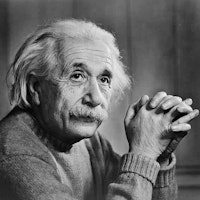I am enough of an artist to draw freely upon my imagination. Imagination encircles the world.
Albert Einstein

Imagination Encircles the World
Topic: The Natural World
I am enough of an artist to draw freely upon my imagination. Imagination is more important than knowledge. Knowledge is limited. Imagination encircles the world.
Albert Einstein, born on 14 March 1879 and passing away on 18 April 1955, stands as one of the most renowned theoretical physicists in history. Best known for his groundbreaking special and general theories of relativity, his scientific endeavors spanned a multitude of areas within the field of physics. Amongst his numerous accolades, he was awarded the Nobel Prize in physics for his elucidation of the photoelectric effect—a phenomenon that expanded the horizons of quantum theory.
Einstein's journey, however, wasn't merely defined by scientific discoveries, but by the myriad challenges he overcame across various dimensions of his life. In his spiritual journey, he grappled with the concepts of God and universe. Socially, he navigated the complexities of his time—facing the rise of anti-Semitism, experiencing exile from his homeland due to Nazi oppression, and advocating for civil rights, disarmament, and global peace. These adversities only strengthened his resolve and underscored his resilience.
Beyond his professional accomplishments, Einstein's life was enriched by a tapestry of relationships and dialogues with luminaries from diverse fields. He engaged in profound conversations on the nature of reality with the likes of the Indian poet Rabindranath Tagore, discussed the principles of non-violence with Mohandas Gandhi, and deliberated on humanitarian issues with Albert Schweitzer. Furthermore, his camaraderie with fellow scientists and physicists provided a fertile ground for intellectual exchanges, fostering an environment of collaboration and innovation during one of the most exciting epochs in scientific history.
Albert Einstein [What Life Means to Einstein: An Interview by George Sylvester Viereck, The Saturday Evening Post (26 October 1929)] p. 17.

Albert Einstein
Theme: Circular Motion

About This Albert Einstein Quotation [Commentary]
Within Albert Einstein’s profound assertion, “I am enough of an artist to draw freely upon my imagination. Imagination is more important than knowledge. Knowledge is limited. Imagination encircles the world,” lies a deeply contemplative insight into the nature of human understanding. Einstein, with his brilliance and humility, recognized the delicate balance between the finite and the boundless, the role of knowledge as a foundation and the power of imagination as an unfettered force.
When Einstein speaks of imagination’s power to “encircle the world,” he hints at a comprehensive vision that captures more than the eye can see or the hand can touch. This is not about gathering facts, but about cultivating insight, understanding the interconnectedness that threads through our existence. His assertion moves us to consider a deeper form of wisdom—one that is inclusive and expansive. The imagery of a circle implies infinity, completeness, and an ongoing journey. By valuing imagination, Einstein calls us to move beyond the constraints of our present knowledge, to widen our intellectual and emotional embrace, and to find beauty in the potential of what could come to pass.
Philip Burley, Channeled Conversation with Albert Einstein
An additional Albert Einstein Quotation
Resources
Related Quotes
Copyright © 2017 – 2026 LuminaryQuotes.com About Us